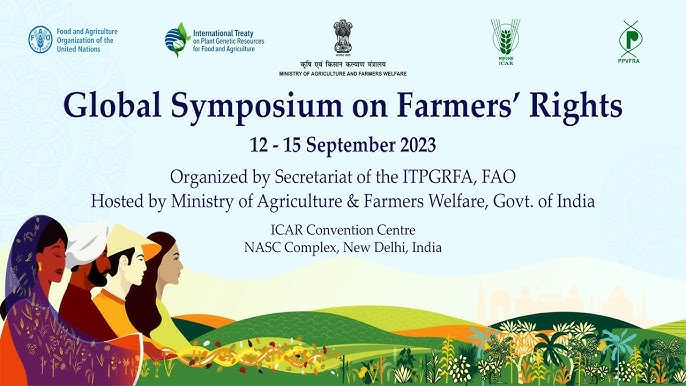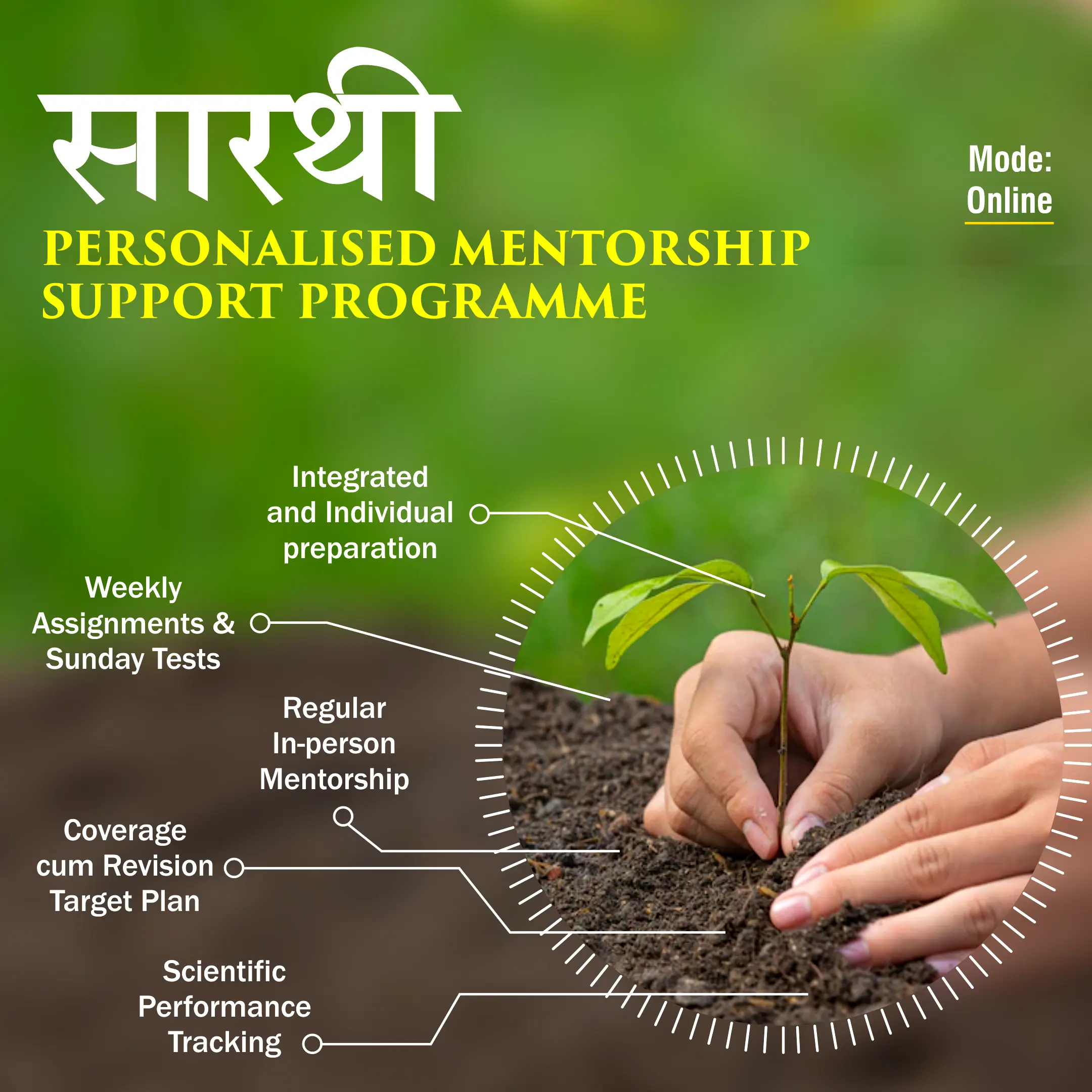
Copyright infringement not intended
Picture Courtesy:
Indian Council of Agricultural Research
Context: The International Treaty on Plant Genetic Resources for Food and Agriculture hosted a global symposium on farmers’ rights, which was inaugurated by the President of India. The symposium aims to explore the challenges and opportunities of implementing farmers’ rights across the world.
Key Highlights of the Global Symposium on Farmers' Rights
Focus on Farmers' Rights
- The symposium places a strong emphasis on farmers' rights as its central theme. This focus underscores the importance of recognizing and safeguarding the rights of farmers, ensuring that they have the necessary legal, economic, and social protections to support their livelihoods and contributions to agriculture.
Proposal for Future Work
- Within the symposium, participants engage in discussions and deliberations aimed at formulating proposals for future work related to farmers' rights. These proposals can encompass a wide range of topics, from policy recommendations to practical strategies for implementation, and they have the potential to shape the direction of future initiatives and actions in this crucial area.
Knowledge and Awareness
- An essential outcome of the symposium is the promotion of knowledge and awareness regarding farmers' rights among its participants. By increasing understanding and awareness, the event equips individuals and organizations with the tools and information needed for effective advocacy and protection of farmers' rights on a global scale.
Sharing Best Practices
- The symposium serves as a valuable platform for stakeholders to share best practices, experiences, and lessons learned related to farmers' rights. This sharing of knowledge promotes collaboration among participants and encourages innovation in the development of strategies and policies to support farmers' rights.
The interconnectedness of Farmers' Rights and Human Rights
- The exploration of the interconnectedness between farmers' rights and human rights is a crucial aspect of the symposium. Recognizing that farmers' rights are intrinsic to human rights underscores their significance within the broader context of agriculture and farming. This perspective fosters a more holistic understanding of the complex issues surrounding farmers' rights and the impact they have on the lives of individuals and communities.

Significance of the Symposium
Global Perspective
- The symposium serves as a global platform, bringing together stakeholders from various countries and regions. This global perspective is crucial because it recognizes that farmers' rights are not confined to a specific geography but are relevant and important worldwide. It allows for the exchange of ideas and solutions that can benefit farmers in diverse contexts.
Awareness and Knowledge
- By increasing awareness and knowledge about farmers' rights, the symposium contributes to better protection and promotion of these rights on a global scale. When individuals, organizations, and governments are well-informed about farmers' rights, they are more likely to take action to uphold and strengthen these rights, ensuring that farmers have the necessary support and legal protections.
Sharing of Best Practices
- The symposium provides a platform for participants to share their experiences and best practices related to farmers' rights. This sharing of knowledge fosters a collaborative environment where stakeholders can learn from each other's successes and challenges. As a result, more effective policies and approaches can be developed and implemented, benefiting farmers and agricultural communities worldwide.
Steps Taken by India demonstrate the country's commitment
Protection of Plant Varieties and Farmers’ Rights Authority
- This authority plays a pivotal role in safeguarding the rights of both plant breeders and farmers. It ensures that plant breeders receive recognition and compensation for their innovations, encouraging further research and development in agriculture. Simultaneously, it protects the rights of farmers to save, use, sow, re-sow, exchange, share, or sell their farm produce, including seeds of protected varieties. This balance promotes fairness and innovation in agriculture.
Indian Council of Agricultural Research (ICAR)
- ICAR is a premier institution in India responsible for coordinating and promoting agricultural research and education. It works on developing and disseminating improved agricultural technologies and practices. ICAR's efforts contribute directly to enhancing farmers' welfare by providing them with innovative solutions for sustainable and productive farming.
Indian Agricultural Research Institute (IARI)
- IARI is at the forefront of agricultural research and development in India. It conducts research activities aimed at improving agricultural practices, crop varieties, and farming techniques. The institute's work directly benefits farmers by increasing crop yields, improving crop resilience, and promoting sustainable agricultural practices.
National Bureau of Plant Genetic Resources (NBPGR)
- NBPGR focuses on the preservation and maintenance of plant genetic resources, including the collection, characterization, conservation, and utilization of plant genetic material. This is crucial for farmers' rights because it ensures the availability of diverse plant genetic resources, which can be used to develop new crop varieties that are adapted to changing environmental conditions and meet the needs of farmers.
Challenges that need to be addressed to ensure the protection and promotion of farmer’s rights
Awareness Gap
- The lack of awareness among farmers about their rights is a significant challenge. Many farmers may not be familiar with the legal protections and entitlements available to them. Bridging this awareness gap is crucial to empower farmers to assert their rights effectively. Outreach programs, education campaigns, and farmer training initiatives can help in raising awareness among farming communities.
Access to Resources
- Equitable access to essential resources such as seeds, land, and credit remains a challenge in many agricultural communities. Disparities in access can lead to inequalities in agricultural productivity and income.
- Governments and organizations must work to ensure that resources are distributed fairly and that marginalized or disadvantaged farmers have equal opportunities to access these resources. Implementing land reform policies, providing affordable credit options, and promoting seed banks can help address this challenge.
Legal Frameworks
- Developing and enforcing strong legal frameworks to protect farmers' rights can indeed be complex, involving legal, administrative, and regulatory processes. It requires collaboration between governments, legal experts, agricultural organizations, and other stakeholders.
- Crafting clear and comprehensive legislation that covers various aspects of farmers' rights, such as seed saving, fair compensation, and protection against biopiracy, is essential. Additionally, effective enforcement mechanisms and dispute-resolution processes must be put in place to ensure that farmers' rights are upheld.
Ways forward for addressing the challenges
Education and Awareness
- Continuous efforts to educate farmers about their rights and how to exercise them are fundamental. Farmer education programs, workshops, and information campaigns can play a pivotal role in ensuring that farmers are informed about their entitlements and legal protections. Extension services and agricultural advisors can also be instrumental in disseminating this knowledge.
Policy Reforms
- Governments should regularly review and update agricultural policies to align them with the protection of farmers' rights. This may involve amending existing laws, creating new legislation, and ensuring that policies are in sync with changing agricultural dynamics. Policy reforms should aim to create a supportive environment for farmers to exercise their rights.
International Collaboration
- Collaborative efforts among nations can lead to a more comprehensive approach to protecting farmers' rights globally. Sharing best practices, exchanging information, and working together to address common challenges can strengthen the international framework for safeguarding farmers' rights. International agreements and conventions can be instrumental in fostering such collaboration.
Research and Innovation
- Encouraging research and innovation in agriculture is critical for empowering farmers and enhancing their rights. Investments in agricultural research can lead to the development of improved crop varieties, sustainable farming practices, and innovative technologies that benefit farmers. Farmers should have access to these innovations to improve their productivity and livelihoods.
Stakeholder Engagement
- Engaging with various stakeholders is essential for a holistic approach to farmers' rights. Involving farmers, researchers, policymakers, non-governmental organizations (NGOs), and other relevant parties in the decision-making process ensures that policies and initiatives are well-informed and inclusive. Collaboration and dialogue among these stakeholders can lead to more effective solutions.

Conclusion
- The global symposium on farmers' rights, with the involvement of Indian institutions and President Droupadi Murmu, serves as a significant platform for addressing challenges, sharing knowledge, and promoting the realization of farmers' rights worldwide. India has taken steps to protect these rights, but there are ongoing challenges that require continued efforts and collaboration on both national and international levels.
Must Read Articles:
FARMER DISTRESS INDEX: https://www.iasgyan.in/daily-current-affairs/farmer-distress-index
UNIQUE PACKAGE FOR FARMERS: https://www.iasgyan.in/daily-current-affairs/unique-package-for-farmers
|
PRACTICE QUESTION
Q. What is the current socioeconomic status and agricultural challenges faced by Indian farmers, and how has the government addressed these issues with specific policies? What are the primary obstacles to further enhancing farmer well-being, and what strategies are being explored for sustainable agricultural development and increased farmer prosperity?
|
https://epaper.thehindu.com/ccidist-ws/th/th_delhi/issues/51525/OPS/GHQBO4F67.1+G5UBO6G1P.1.html




